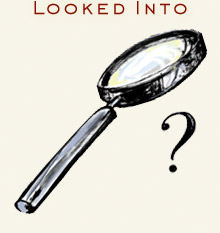Emdashes—Modern Times Between the Lines
The Basics:
About Emdashes | Email us
Ask the Librarians
Best of Emdashes: Hit Parade
A Web Comic: The Wavy Rule
Features & Columns:
Headline Shooter
On the Spot
Looked Into
Sempé Fi: Cover Art
New Yorker Practically Tops GOOD List of Best Magazines; Also, Deadly Spiders
Filed under: Looked Into Tagged: awards, Burkhard Bilger, magazines

From the GOOD story (note that #1 is the 1961–1973 Esquire, i.e., not in print; that said, I’m not alone in thinking the current Esquire is damn fine reading):
Also, in case this week’s Burkhard Bilger story about venomous spiders is concerning you for any reason, here is the USA Spider Identification Chart, with suitably frightening illustrations; these are the spiders from which you, Ms. Muffet-like, should definitely run. The page includes an offer for a free spider identification poster of your own, and these good people will email you—as quickly as you may, unfortunately, need it—“Spider Bite FIRST AID information.” Godspeed!
2. The New YorkerThanks to Lisa Levy for the link! (By the way, what does “over-educated” mean? The world’s great scientists, leaders, philosophers, &c., and your average cabin boy or housewife of many an era, would surely consider most of us disconcertingly under-educated.)
A rare cultural touchstone both relevant and revered nearly a century after its inception in 1925, The New Yorker has remained a beacon of intellectual clarity and incisive reporting to over-educated bourgeoisie far beyond the borders of Manhattan. With a design that has changed only imperceptibly over the decades (except for earth-shattering changes under mid-1990s editor Tina Brown,who allowed—gasp!—color and—the horror!—photographs), all that’s different at the magazine are the stories it covers. The New Yorker today is just as willing to publish a barely illustrated, three-part, 30,000-word jeremiad on climate change as founding editor Harold Ross was happy to devote an entire issue to one article on the aftermath of the Hiroshima bombing. This is not to mention the fiction, humor, poetry, criticism, and cartoons—all parts of a consistently brilliant editorial vision.
Also, in case this week’s Burkhard Bilger story about venomous spiders is concerning you for any reason, here is the USA Spider Identification Chart, with suitably frightening illustrations; these are the spiders from which you, Ms. Muffet-like, should definitely run. The page includes an offer for a free spider identification poster of your own, and these good people will email you—as quickly as you may, unfortunately, need it—“Spider Bite FIRST AID information.” Godspeed!




Comments
I agree on Esquire’s quality. But your reference to the Little Miss made me wonder: why isn’t “muffet” a common noun? There’s muffin, muffineer, muffle and its variants, and even muffuletta. I think we need a muffet. Would you care to attempt a definition (other than “one afraid of spiders”)?
I’ll work on it! Meanwhile, don’t forget “mufti,” the word (I say affectionately) that John Lahr uses in just about every piece.
As a Miss Muffet, I agree.
BTW - “overeducated” is a word I’ve only ever heard in the USA. I just thought I’d throw that one out there. Perhaps it just means “over-rich”, since only those with a lot of money to throw around can over-indulge in education? Whereas in France, you’re in for free till you flunk or get a move on. (Freshman year at Paris-Jussieu was 4000 students, second year 2000, third year 1000, and fourth year 500. Which only leaves “undereducated” people, I suppose! That said, when your grocer can quote Rousseau or Racine, I think standards for the “undereducated” are actually rather high still.)